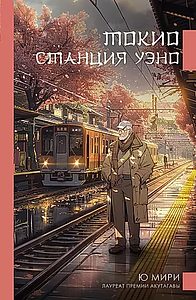Take a photo of a barcode or cover
The author certainly captured the realities of a homeless existence in Tokyo or any large metropolis. This is noteworthy as Japan has tried to conceal its problems. The author sprinkled various Tokyo sites into the narrative which I appreciated, since I hope to visit Japan. Tokyo Ueno Station is not written in a linear style. I would also characterize the writing as spared down which had me guessing about the speaker and setting.
The earthquake, tsunami, and nuclear reactor disasters of 2011 figured in the story. This is the second Japanese novel I have read this year that includes the horrific events of March 2011. The Japanese are not strangers to natural disasters, so this particular earthquake and tidal wave must be significant for the people, psychologically and politically. Perhaps, some Japanese are becoming comfortable expressing their emotional reactions more publically.
Yu Miri, the writer, has moved to the former disaster area.
The earthquake, tsunami, and nuclear reactor disasters of 2011 figured in the story. This is the second Japanese novel I have read this year that includes the horrific events of March 2011. The Japanese are not strangers to natural disasters, so this particular earthquake and tidal wave must be significant for the people, psychologically and politically. Perhaps, some Japanese are becoming comfortable expressing their emotional reactions more publically.
Yu Miri, the writer, has moved to the former disaster area.
Review of my first attempt to read this book:
I think I would need additional resources to read/appreciate this book, even if just in Japanese geography.
Thoughts after my second attempt, in which I was kindly given additional resources to read & appreciate this book!:
This is a short book (~4 hours on audio), but its scope is vast. The theme of "work/life balance" (not called that here, but what we might blithely refer to) especially resonated for me with this reading. I also liked considering what is visible vs invisible, or seen vs not seen, in a society. I found the book a bit difficult early on, as it felt meandering and wandering, and/but the narrative arc really seemed to tighten up to me as the book went on. This made it easier for me to grasp, and made me reflect on why that uncertainty early on was challenging. Overall, I found the book pretty sad, and/but I enjoyed some of the meditations on grief. Very thought-provoking!
I think I would need additional resources to read/appreciate this book, even if just in Japanese geography.
Thoughts after my second attempt, in which I was kindly given additional resources to read & appreciate this book!:
This is a short book (~4 hours on audio), but its scope is vast. The theme of "work/life balance" (not called that here, but what we might blithely refer to) especially resonated for me with this reading. I also liked considering what is visible vs invisible, or seen vs not seen, in a society. I found the book a bit difficult early on, as it felt meandering and wandering, and/but the narrative arc really seemed to tighten up to me as the book went on. This made it easier for me to grasp, and made me reflect on why that uncertainty early on was challenging. Overall, I found the book pretty sad, and/but I enjoyed some of the meditations on grief. Very thought-provoking!
this made me feel something, which is my main criteria for 5 star books. hmm
in other ways this was a 3 - 4.5 star book, some explanations were too long winded for me but it did catch my heart in a way, i liked the style, so a spontaneous five for a moment at least!
(also i'm sick of somehow only having 2 or 4 star books this year, what is up with that?! if i hadnt this would probably be another 4 star?? i think i need to go over all of them again and even out my ratings..?)
in other ways this was a 3 - 4.5 star book, some explanations were too long winded for me but it did catch my heart in a way, i liked the style, so a spontaneous five for a moment at least!
(also i'm sick of somehow only having 2 or 4 star books this year, what is up with that?! if i hadnt this would probably be another 4 star?? i think i need to go over all of them again and even out my ratings..?)
i love short books.
anyone can make a point with hundreds of pages to do it. in less than 200, tokyo ueno station is as thoughtful and effective, and significantly more striking.
we follow kazu, a recently dead homeless man who, as a ghost, is only as unseen and ignored as any other homeless person in the villages that make up the park he spent his life and death in. kazu's life is tied to the olympics, where his roots as a laborer led him to the path of poverty and struggle life cruelly put him on, and to the japanese imperial family, whose opulence is always near and yet so far away.
within just these parameters, miri's exploration of global imperialism, wealth, and greed is unforgettable. each choice is purposeful and powerful, and it's a tiny book i'll remember for a long time.
bottom line: much more than the sum of its pages.
anyone can make a point with hundreds of pages to do it. in less than 200, tokyo ueno station is as thoughtful and effective, and significantly more striking.
we follow kazu, a recently dead homeless man who, as a ghost, is only as unseen and ignored as any other homeless person in the villages that make up the park he spent his life and death in. kazu's life is tied to the olympics, where his roots as a laborer led him to the path of poverty and struggle life cruelly put him on, and to the japanese imperial family, whose opulence is always near and yet so far away.
within just these parameters, miri's exploration of global imperialism, wealth, and greed is unforgettable. each choice is purposeful and powerful, and it's a tiny book i'll remember for a long time.
bottom line: much more than the sum of its pages.
I was not the intended audience! As with most Japanese translations, i found the prose beautiful but it was just so sad and steeped in historical contexts that just wasnt for me.
A mundane read about the homeless ghost of a man living in the park near the Tokyo Ueno station. Explores the experience of being homeless, working your life away, and constant, never-ending loss.
An absolutely miserable, devastating read. For such a short book, it took me so long to get through.
dark
emotional
sad
medium-paced
Plot or Character Driven:
A mix
Strong character development:
Yes
Loveable characters:
Complicated
Diverse cast of characters:
No
Flaws of characters a main focus:
Yes
This really drove home how homeless people are treated almost like ghosts while they're alive. It's pretty relentlessly bleak, which I guess is kind of the point. I thought the prose of the translation was good.
In terms of my political position, these sort of stories are certainly important in centering marginalized and erased communities. Japan is not alone in needing to do much better to empower and care for the unhoused.
Yet as a reader, I can only handle so much emotional brutality! I think even I shield myself from the pain and sadness of the homeless crisis in America (I’d collapse into a puddle if I let it really sink in), and I wondered if my reaction was unfair. But the story feels like one only of victimhood, passivity, and trauma—erasing the possibility of agency and liberation by and for the unhoused. We should allow ourselves to feel the pain of stories like these but the book ends feeling like an open wound—devastated and angry, but lost in the same world of the ghost: all feeling with no where to go.
Yet as a reader, I can only handle so much emotional brutality! I think even I shield myself from the pain and sadness of the homeless crisis in America (I’d collapse into a puddle if I let it really sink in), and I wondered if my reaction was unfair. But the story feels like one only of victimhood, passivity, and trauma—erasing the possibility of agency and liberation by and for the unhoused. We should allow ourselves to feel the pain of stories like these but the book ends feeling like an open wound—devastated and angry, but lost in the same world of the ghost: all feeling with no where to go.



